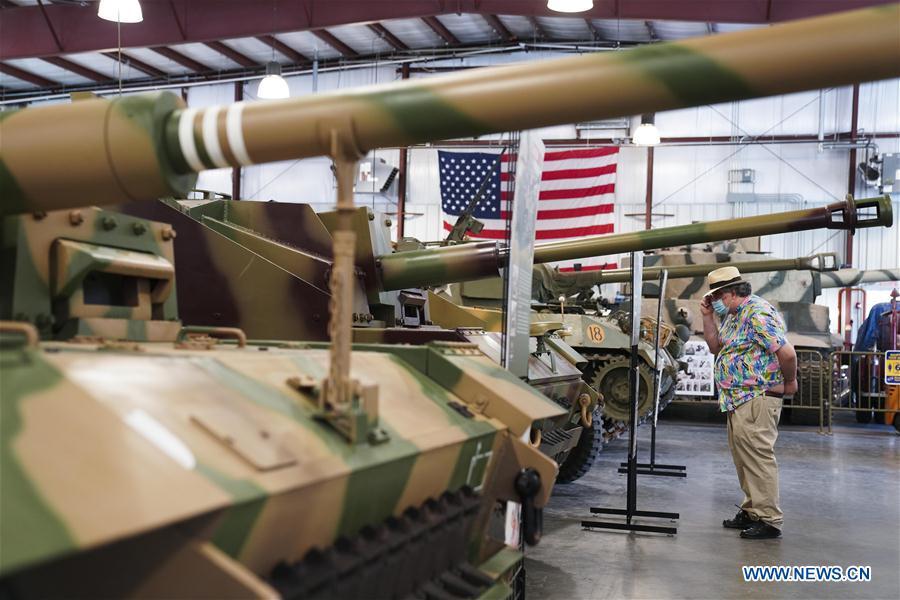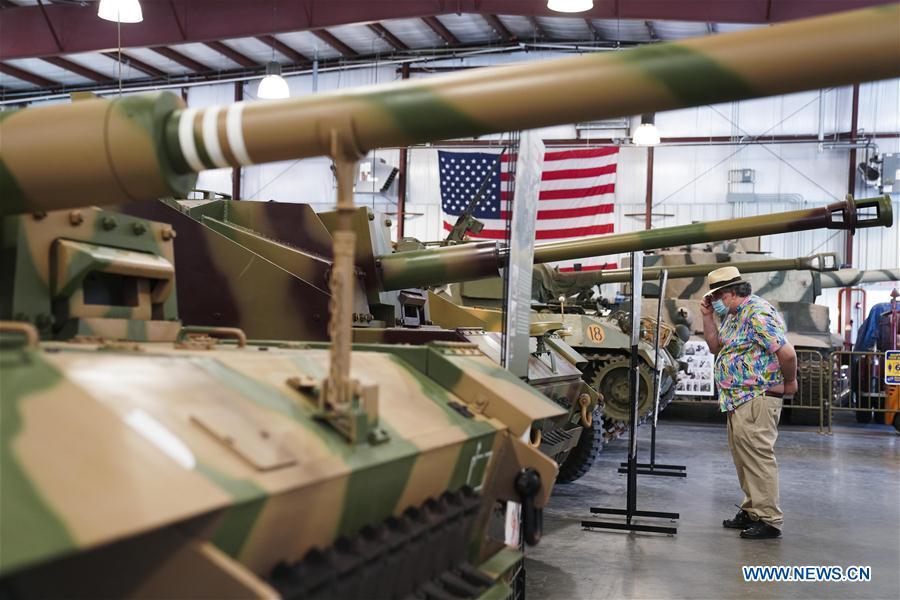
A visitor looks at exhibits in the Museum of American Armor on Long Island of New York State, the United States, Aug. 15, 2020. (Xinhua/Wang Ying)
by Xinhua writers Liu Yanan, Xing Yue, Wei Ying
NEW YORK, Aug. 15 (Xinhua) -- As Saturday marked the 75th anniversary of the Japanese surrender in World War II, staff members of the Museum of American Armor on Long Island, New York State were discussing history in both the exhibition hall and an immersive encampment.
There is a regrettable unawareness of World War II, its strategic implications and how it defined China, Europe and the United States, said Gary Lewi, a board member and spokesman of the museum, on Saturday.
Even though the museum receives thousands of visitors each year, Lewi said there is unfortunately widespread ignorance about historical facts regarding the Rape of Nanking (Nanjing), the terrible retribution the Chinese had to face after the Doolittle Raid on Tokyo, and how many American aviators were rescued by the Chinese.
There's an entire generation in the United States that has no idea about the sacrifice of the Chinese people during the Japanese aggression, Lewi told Xinhua.
"So we have a story to tell. You have a story that you need to tell, because that history joins our two countries together, and that's something that has a tendency to be productive," he said.
Talking about the Flying Tigers, volunteer pilots fighting the Japanese forces in China from 1941 to 1942, Lewi said the Chinese people rescued them despite enormous risks. "So there are some fairly important stories that need to be repeated perhaps now more than ever," Lewi said.
As many World War II veterans have passed away, it has become far more important to tell World War II stories candidly, according to Lewi.
Put into operation in 2014, the museum's mission is to make sure that people who come here can be aware of history and how it continues to define the 21st century, Lewi said.
As for the lessons learnt from World War II, Lewi said it's widely acknowledged that conflicts of any kind, given the power of weapons, would be the end of civilization.
"Hopefully, we have very wise leaders around the world to recognize that another war would be a catastrophe for everybody," he said, adding that they hope international bodies, such as the United Nations, can continue to serve as a forum for dealing with conflicts.
"I think the lesson now is to make sure that future conflicts are avoided at all costs," he noted.
"I am deeply opposed, except for extreme defensive necessity, to conflicts between nations that are resolved by bombs and military battles," said Dr. Patrick T. Conley, a renowned historian from Rhode Island.
The museum also displayed multiple repurposed World War II posters since it was reopened to the public on July 31, encouraging people to take precautionary measures and fight against the common foe of COVID-19.
"These posters have been repurposed and remind visitors that we need to come together and observe all the safety protocols to prevent COVID-19 from spreading in much the way the allies came together during World War II to fight a common foe," Lewi said.
Paul A. Tenkotte, a professor of history at Northern Kentucky University, also stressed the importance of joint efforts from different countries in fighting against COVID-19.
"It will require a concerted effort of every nation to defeat COVID-19, and to assure that people worldwide receive vaccines when they become available. That alone will require a massive international logistical effort," Tenkotte said, adding that pandemics, like wars, do not respect national borders.
"COVID-19 is today's common foe. It threatens each and every country, each and every society, each and every economy," Lewi said.




 A single purchase
A single purchase









